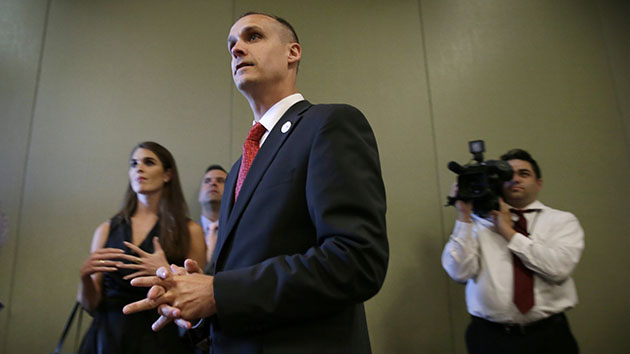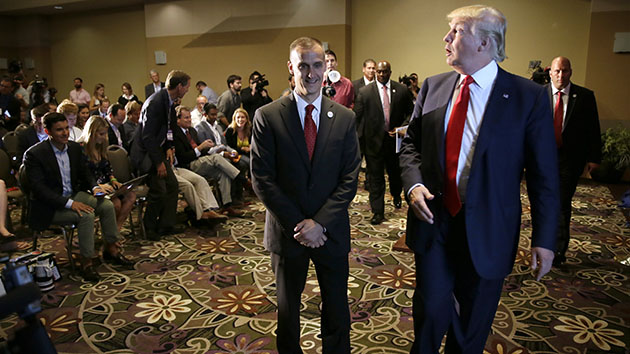In 2011, several years before Corey Lewandowski became the controversial campaign manager of Donald Trump’s presidential bid, he moderated a panel featuring Andrew Breitbart, the late conservative provocateur and media bigwig, and he posed an earnest question: Why do politicos, faced with their own wrongdoing, so often shamelessly deny the allegations and get away with it?
That exchange now seems particularly relevant, with the Trump campaign and Lewandowski juggling controversies and crises and often responding by challenging reality. Recently, Lewandowski came under fire for manhandling Michelle Fields, a reporter working for the eponymous news organization that Breitbart founded. Lewandowski’s aggressive behavior again became a campaign issue a week later when footage circulated that appeared to show him at a Trump rally roughly grabbing a protester by the shirt collar. In both episodes, the Trump campaign’s response was to deny that Lewandowski had committed the acts in question and to counterattack—a move that is in sync with Breitbart’s answer to Lewandowski’s question five years ago.
That question came during an Americans for Prosperity-sponsored panel in New Hampshire on September 17, 2011, held about six months prior to Breitbart’s sudden death at the age of 43. Lewandowski, who was the East Coast regional director for the Koch-backed Americans for Prosperity, asked Breitbart, “Why do you think politicians involved in scandals insist on repeating the same old pattern of denying any wrongdoing—promising to clear their names—when the entire time they know what they’ve been accused of, and why don’t they just stop, and stop the further embarrassment?”
Breitbart replied by invoking the Monica Lewinsky scandal—a controversy that got its start in the Drudge Report, where Breitbart had once worked as an editor—and, with scorn, Breitbart noted how effectively the Clintons had dodged the accusations:
Everything I needed to learn about scandal and the Democrat-Media Complex, I learned when I was working with Drudge during the Clinton-Lewinsky thing. And I remember when [Drudge] called me up the night before he launched the Lewinsky thing. In my naivete, I said, “Wow, you’ve got this guy. It’s going to be over, tomorrow.”
Instead, in Breitbart’s telling, the Clintons weathered the scandal by lying their way through it and attacking the credibility of their accusers. Breitbart claimed the mainstream media aided the Clintons in their effort to evade the controversy and later helped Bill Clinton rehabilitate his reputation.
By lying, [the Clintons] bought eight months, which forced [special prosecutor] Ken Starr to put the details out there. Those details ended up extricating [Bill Clinton], so by lying and having the media on your side, to push those lies, they were able to take a slam dunk and push it back through the hoop.
…At the time they were not only able to defend themselves, they proactively went after…Republicans, and investigated every possible sexual misdeed they had done going back as far as Henry Hyde’s affair in the 1960s, and they just dumped it out there. And Bob Livingston stepped down as the Speaker of the House back then.
And the answer is that Republicans are forced, when confronted with scandal, to step down immediately because they know they won’t have the press to play the Humpty Dumpty role to put the pieces back together, which is what they’re willing to do for Democrats. The media is the only battle that matters.
Whether or not Lewandowski internalized Breitbart’s message that day, he and the Trump campaign have relied on a strategy of denial and counterattack. After Fields—and others—said she had been yanked nearly to the ground by Lewandowski, the Trump campaign vehemently denied that Lewandowski had been involved. “The accusation, which has only been made in the media and never addressed directly with the campaign, is entirely false,” Trump spokeswoman Hope Hicks said in a press release. Hicks also challenged Fields’ credibility, alluding to another incident, when Fields said she had been pushed to the ground while covering an Occupy movement protest: “We leave to others whether this [sic] part of a larger pattern of exaggerating incidents, but on multiple occasions she has become part of the news story as opposed to reporting it. Recall she also claimed to have been beaten by a New York City Police Officer.”
Lewandowski soon took to Twitter to attack Fields.
Michelle Fields is an attention seeker who once claimed Allen West groped her but later went silent. https://t.co/J86Ej42eYx
— Corey Lewandowski (@CLewandowski_) March 10, 2016
Breitbart News, which had been one of Trump’s biggest media cheerleaders, melted down over the controversy. The site eventually ran a story suggesting that someone who looked like Lewandowski had grabbed Fields, and Lewandowski wasted no time promoting Breitbart’s alternative version of events.
The Scrum: Video Emerges to Suggest WaPo Reporter Ben Terris Misidentifies Lewandowski in Fields Incident Breitbart https://t.co/wJ51Mkj27e
— Corey Lewandowski (@CLewandowski_) March 11, 2016
Now on the defensive, Fields publicly posted pictures of her bruises, filed a police report, and shortly thereafter resigned from Breitbart. The website soon seemed to embrace what Andrew Breitbart had called the “Humpty Dumpty role”: carefully reconstructing the candidate’s image.
Trump Against the World: The Donald Regains Control in Home Stretch – Breitbart https://t.co/zINqiG8L7p
— Corey Lewandowski (@CLewandowski_) March 13, 2016













